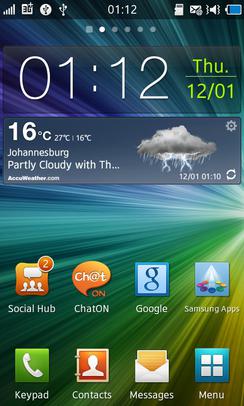
The Motorola Razr is a brand of design-oriented mobile phones manufactured by Motorola Mobility, a division of Lenovo. Its current iteration since 2019, styled motorola razr, consist of foldable smartphones reminiscent of the original Razr line of flip phones.
MotoMagx was a Linux kernel-based mobile operating system developed and launched in 2007 by Motorola to run on their mid-to-high-end mobile phones. The system was based on MontaVista's Mobilinux. Originally intended for 60% of their upcoming devices, it was soon dropped in favor of Android and Windows Mobile operating systems.
The Motorola ROKR, the first version of which was informally known as the iTunes phone, was a series of mobile phones from Motorola, part of a 4LTR line developed before the spin out of Motorola Mobility. ROKR models were released starting in September 2005 and ending in 2009. They were notable for incorporating support of media player features.

The Open Handset Alliance (OHA) is a consortium of 84 firms to develop open standards for mobile devices. Member firms include HTC, Sony, Dell, Intel, Motorola, Qualcomm, Texas Instruments, Google, Samsung Electronics, LG Electronics, T-Mobile, Nvidia, and Wind River Systems.
A mobile operating system is an operating system for smartphones, tablets, smartwatches, smartglasses, or other non-laptop personal mobile computing devices. While computers such as typical/mobile laptops are "mobile", the operating systems used on them are generally not considered mobile ones, as they were originally designed for desktop computers that historically did not have or need specific mobile features. This line distinguishing mobile and other forms has become blurred in recent years, due to the fact that newer devices have become smaller and more mobile unlike hardware of the past. Key notabilities blurring this line are the introduction of tablet computers and light-weight laptops and the hybridization of the two in 2-in-1 PCs.
The Motorola Razr2 (often stylized as RAZR2) is a series of clamshell/flip mobile phones from Motorola, and is one of the series in the 4LTR line. It is the successor to the popular Razr series. The Razr2 is 2 mm thinner than its predecessor but slightly wider. Some versions feature Motorola's MotoMagx operational platform, based on the MontaVista Linux OS. The Razr2 was made available on every US carrier, and EVDO, GSM and HSDPA versions of it were released by late 2007.

Moblin, short for 'mobile Linux', is a discontinued open source operating system and application stack for Mobile Internet Devices (MIDs), netbooks, nettops and embedded devices.

The Symbian Foundation was a non-profit organisation that stewarded the Symbian operating system for mobile phones which previously had been owned and licensed by Symbian Ltd. Symbian Foundation never directly developed the platform, but evangelised, co-ordinated and ensured compatibility. It also provided key services to its members and the community such as collecting, building and distributing Symbian source code. During its time it competed against the Open Handset Alliance and the LiMo Foundation.

Bada is a discontinued mobile operating system developed by Samsung Electronics for devices such as mid- to high-end smartphones and tablet computers. The name is derived from "바다 (bada)", meaning "ocean" or "sea" in Korean. All phones running Bada were branded with the name Wave, unlike Samsung's Android devices which are branded as Galaxy.

Symbian is a discontinued mobile operating system (OS) and computing platform designed for smartphones. It was originally developed as a proprietary software OS for personal digital assistants in 1998 by the Symbian Ltd. consortium. Symbian OS is a descendant of Psion's EPOC, and was released exclusively on ARM processors, although an unreleased x86 port existed. Symbian was used by many major mobile phone brands, like Samsung, Motorola, Sony Ericsson, and above all by Nokia. It was also prevalent in Japan by brands including Fujitsu, Sharp and Mitsubishi. As a pioneer that established the smartphone industry, it was the most popular smartphone OS on a worldwide average until the end of 2010, at a time when smartphones were in limited use, when it was overtaken by iOS and Android. It was notably less popular in North America.

MeeGo is a discontinued Linux distribution hosted by the Linux Foundation, using source code from the operating systems Moblin and Maemo. MeeGo was primarily targeted at mobile devices and information appliances in the consumer electronics market. It was designed to act as an operating system for hardware platforms such as netbooks, entry-level desktops, nettops, tablet computers, mobile computing and communications devices, in-vehicle infotainment devices, SmartTV / ConnectedTV, IPTV-boxes, smart phones, and other embedded systems.
MSM7000 is a series of system-on-a-chip processors manufactured by Qualcomm for handheld devices, especially smartphones.

Tizen is a Linux-based mobile operating system backed by the Linux Foundation, developed and used primarily by Samsung Electronics.

Mer was a free and open-source software distribution, targeted at hardware vendors to serve as a middleware for Linux kernel-based mobile-oriented operating systems. It is a fork of MeeGo.
Atom is a system on a chip (SoC) platform designed for smartphones and tablet computers, launched by Intel in 2012. It is a continuation of the partnership announced by Intel and Google on September 13, 2011 to provide support for the Android operating system on Intel x86 processors. This range competes with existing SoCs developed for the smartphone and tablet market from companies such as Texas Instruments, Nvidia, Qualcomm and Samsung. Unlike these companies, which use ARM-based CPUs designed from the beginning to consume very low power, Intel has adapted the x86-based Intel Atom line of CPU developed for low power usage in netbooks, to even lower power usage.

Jolla Oy is a Finnish technology company; vendor and developer of Sailfish OS. Headquartered in Tampere, Finland, Jolla has its own research and development offices in Helsinki, Tampere and Cyberport, Hong Kong. Jolla was founded in 2011 by former Nokia staff of the MeeGo project team to use the MeeGo opportunities and its "endless possibilities".

Sailfish OS is a Linux-based operating system based on free software, and open source projects such as Mer as well as including a closed source UI. The project is being developed by the Finnish company Jolla.
Besides the Linux distributions designed for general-purpose use on desktops and servers, distributions may be specialized for different purposes including computer architecture support, embedded systems, stability, security, localization to a specific region or language, targeting of specific user groups, support for real-time applications, or commitment to a given desktop environment. Furthermore, some distributions deliberately include only free software. As of 2015, over four hundred Linux distributions are actively developed, with about a dozen distributions being most popular for general-purpose use.










